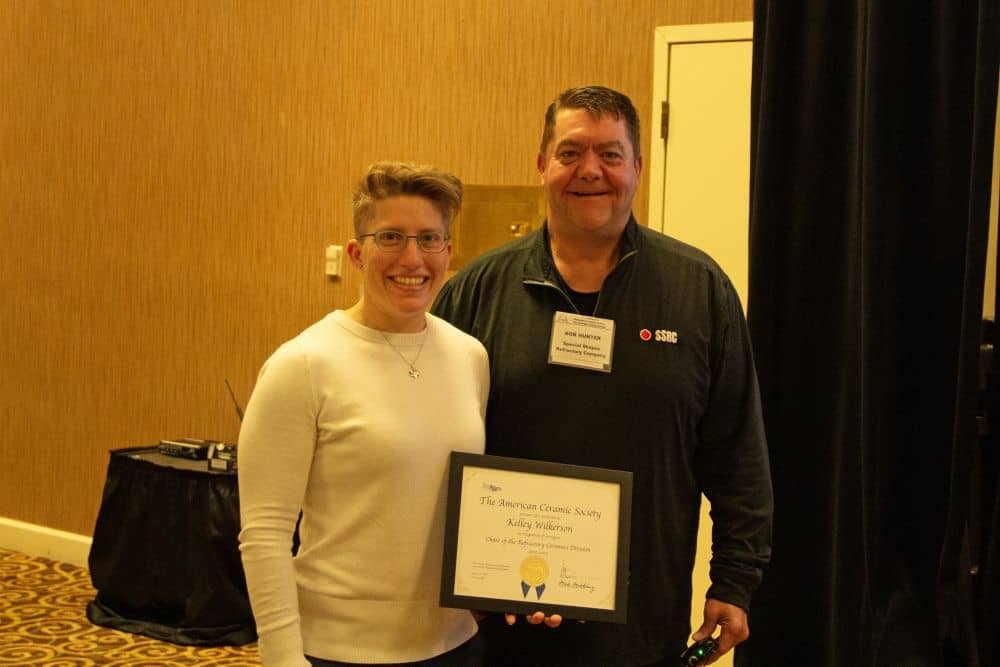
[Image above] Incoming Refractory Ceramics Division chair Bob Hunter (right) recognizes outgoing chair, Kelley Wilkerson. Credit: ACerS
We met in St. Louis!
Rather than a World Fair, as in the 1944 film, the refractory ceramics community found itself drawn to Missouri on March 28–30 to celebrate the in-person return of the ACerS St. Louis Section and Refractory Ceramics Division Annual Symposium on Refractories
It was 2019 when the St. Louis Section/Refractory Ceramics Division last held its Refractories Symposium in person. The 2020 event was cancelled (you know why), the 2021 symposia was held virtually, and last year the symposium was absorbed into UNITECR 2022.
“It was a pleasure to have approximately 220 members of the refractory ceramics community back in St. Louis for the 58th Annual Symposium on Refractories after four long years of being apart,” says Kelley Wilkerson, chair of the Refractory Ceramics Division.
Attendees came from 11 countries spanning the globe: Europe, Canada, South America, Australia, China, India, and Korea. And, close to half were first-time attendees!

“The symposium covered the topic of refractory sustainability this year, a topic near and dear to my heart,” Wilkerson says. “One of my favorite takeaways from the meeting came from Nancy Bunt [keynote speaker], simplifying the concept of sustainability into three key parts: 1. Empower your people, 2. Grow with your customers, and 3. Care for your planet.”
Symposium organizers Alex Stansbery (Resco Products), John Waters, and Behzad Majidi (Pyrotek Inc.) recruited talks that covered the range from sustainable approaches to raw materials (including recycling), to improving thermal processes with refractories, to optimizing refractory formulations, to converting foundry waste to saleable products. There was much discussion of life cycle assessments (LCA) and how corporations are using LCAs and various certification tools to develop robust sustainability programs to hold themselves accountable.
The symposium opened with a keynote address by ACerS Fellow Nancy Bunt. (Be sure to read our interview with her in the March 2023 ACerS Bulletin.) Bunt was an inspired choice for delivering the keynote, as she has nearly 40 years of experience in the industry and is now global sustainability director of Imerys Refractory, Abrasives and Construction Business Area.

The United Nations’ 17 Sustainability Goals are well known, but perhaps less well known is the United Nations Global Compact–Accenture CEO Study. The most recent study defines resilience as “a company’s ability to withstand, adapt, and prosper through uncertainty and volatility—to emerge stronger and strengthen competitive advantage.”
Bunt tied resilience to sustainability, noting that sustainability is at the core of resilience, and she described how the Imerys SustainAgility program supports both sustainability and resilience at the point where most manufacturing begins—raw materials.
Progress toward and achievement of net zero by 2050 will require change, commitment, and a comprehensive approach.
“We will not be able to do what we do 20 years from now,” says Bunt.
And, she notes, the refractories industry is a necessary partner to manufacturing companies for reaching sustainable goals and resiliency.
“The refractory industry has been leading the circular economy longer than it’s been called the circular economy,” she says, by “… doing what we do as refractory producers: balance risk, balance time, balance cost.”
Bunt was followed by newcomer Anthony Williamson. Williamson, a recent chemical engineering graduate from Clemson University, works for the Thermal Ceramics Division at Morgan Advanced Materials. He gave a talk on how the company is addressing the three pillars of sustainability—environment, economy, and society—and the overlap of these principles with environmental, social, and governance (ESG) goals.
Williamson succinctly defined a refractory’s purpose as “stretching one kWh as far as possible through insulation.” Looking to the future, he also talked about projects at Morgan with hydrogen fuel firing, which is environmentally friendly but harder on the refractory.
Other talks addressed interesting and necessary questions, such as how to recycle refractories, optimal design of particle dispersions, and testing protocols.
The symposium closed with a talk by Paul Ormond of Evergreen Alumina, a start-up company tackling the challenge of aluminum foundry waste. Ormond introduced an “industrial waste-to-value” technology based on a closed-system proprietary process that generates neither waste nor effluent. The patent-pending process was developed by refractory industry veteran, Riley Robbins.
Plans are underway to build a plant in West Virgina that will profitably process 100,000 metric tons of secondary aluminum salt slag into salt for aluminum foundries, refractory aggregate, distilled water, and agricultural nitrogen—all of which can be sold for profit.
Two awards were presented at the meeting. The St. Louis Section awarded its Theodore J. Planje Award to David Tucker of Imerys-Mulcoa, and the RCD Allen Award went to professor Stefan Schaffoener of the University of Bayreuth, Germany. Schaffoener reported on his latest research on functional porosity in composite ceramic refractories.

An evening reception and expo gave attendees time to reconnect, talk about business, and meet all those new attendees. Dinner, lunch, a Top Golf kick-off event, and plenty of coffee breaks set the stage for networking and great conversation about refractories. Check out ACerS Flickr page to see more.

Next year’s symposium theme will relate to failure analysis; the details are yet to be worked out.
Meet us in St. Louis in March 2024!
